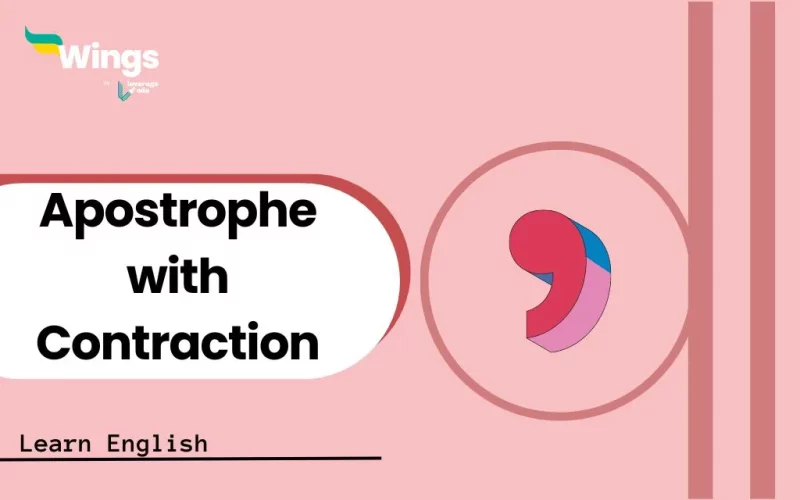Apostrophe with Contractions: Contractions are words that are made up by shortening and putting an apostrophe in them. They are formed by omitting one or more letters from the word. These contractions are not to be used in your formal writing and are meant only for informal conversations such as texts, letters etc. To know the usage of an apostrophe with contractions in English grammar, along with their examples continue reading this blog.
Explore Punctuation Archives
This Blog Includes:
Apostrophes in Contractions
As discussed above, contraction is a word that is made by shortening and combining two words. Words like can’t (can + not), don’t (do + not), and I’ve (I + have) are all contractions. As can be seen, the apostrophe added in a contraction after removing one letter always replaces at least one letter. Contraction is considered a one word, even if it is created from two.
| For example: “Can’t” is a contraction of “cannot.” “Would’ve” is a contraction of “would have.” |
Also read: 21+ Apostrophe Examples in Sentences as Punctuation Mark
Contractions in Informal Writing
Informal contractions are words that are in short forms and phrases in English. Sometimes they are used in casual conversations. They are like slang, a very informal way of speaking. This makes your flow of writing feel less formal and more like talking. These are mainly for casual writing such as dialogue or texts, and emails to friends.
| For Example: “don’t” instead of “do not” “Can’t” instead of “cannot” “you’re” instead of “you are.” |
Read more: How to Use Apostrophes? Learn 3 Golden Rules with Examples
Examples of Apostrophe with Contractions
The below image reflects contractions with apostrophes which will give you an idea of how a contraction is made and can be used in informal writing.

Also Read: Punctuate the Following Sentence (with Answers): Exercise
Worksheet on Apostrophe with Contractions
Exercise: Fill in the blanks with a suitable contraction

Related Punctuational Blogs
FAQs
The apostrophe has three important rules: first, to form possessive nouns, second, to show the omission of letters; and lastly, to indicate plurals of letters, numbers, and symbols.
In a contraction, an apostrophe means missing letters. The most ordinary contractions are made up of verbs, auxiliaries, or modals attached to other words:
“Shee would” = “She’d.” “I have” = “I’ve.” “We are” = “We’re.” “You cannot” = “You can’t.”
The first rule will be using an apostrophe to show possession, second, use an apostrophe and “s” to direct possession with singular nouns. Third and lastly, use an apostrophe after the “s” for plural nouns which end in “s” to show possession.
We hope this blog has provided you with all the necessary information on “apostrophe with contractions.” To advance your grammar knowledge and read more informative blogs, check out our Learn English page and don’t forget to follow Leverage Edu.
 One app for all your study abroad needs
One app for all your study abroad needs














 45,000+ students realised their study abroad dream with us. Take the first step today.
45,000+ students realised their study abroad dream with us. Take the first step today.

